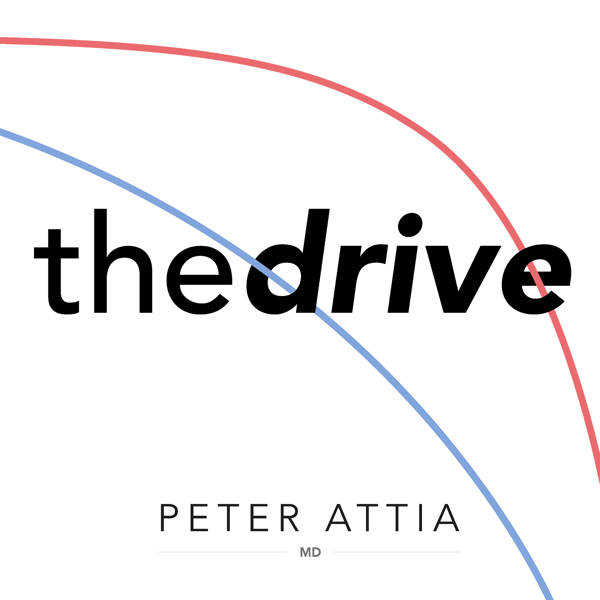#191 - Revolutionizing our understanding of mental illness with optogenetics | Karl Deisseroth M.D., Ph.D.
The Peter Attia Drive
Peter Attia, MD
4.7 • 7.3K Ratings
🗓️ 17 January 2022
⏱️ 149 minutes
🧾️ Download transcript
Summary
View the Show Notes Page for This Episode
Become a Member to Receive Exclusive Content
Episode Description:
Karl Deisseroth is a world-renowned clinical psychiatrist, neuroscientist, and author of Projections: A Story of Human Emotions. In the episode, Karl explains his unique career path that led to the development of optogenetics—a revolutionary technique that uses specialized light-sensitive ion channels to precisely control the activity of select populations of neurons. Karl provides a concise overview of how optogenetics works and how it can be used to better understand mental illness, to identify the neurons responsible for specific behaviors, and to guide development of new treatments. Karl uses his experience as a practicing psychiatrist to provide deep insights into depression, anxiety, autism, and personality disorders and explains the role of optogenetics in mapping out brain regions responsible for common mental health afflictions.
We discuss:
- Karl’s journey through medical school and interest in the brain [5:00];
- A profound medical school experience that changed Karl’s career path to psychiatry [17:30];
- Karl’s commitment to research and challenges overcome early in his career [27:00];
- The state of psychiatry and mental health therapies when Karl started his lab in 2004 [33:15];
- Neuroscience 101: fundamentals of neuroanatomy and neurophysiology [38:15];
- Traditional techniques for identifying the brain regions involved in specific behaviors [47:15];
- Intro to optogenetics and how to get a gene into a neuron [51:15];
- How viruses helped make optogenetics possible [1:01:45];
- How optogenetics was used to investigate the effects of dopamine neurons [1:15:45];
- Appreciating the power of optogenetics [1:22:00];
- Investigating and treating anxiety with optogenetics [1:26:45];
- Autism and autism-related anxiety, and the potential of optogenetics in treating autism [1:38:00];
- Optogenetics as a powerful tool for the discovery and creation of medical treatments [1:45:00];
- Karl’s inspiration to write his book, Projections [1:48:00];
- Mania and bipolar disorder: evolutionary basis, symptoms, and the high prevalence in North America [1:52:45];
- Depression: evolutionary basis and insights from optogenetics [2:03:15];
- The effects of trauma early in life [2:18:45]; and
- More.
Sign Up to Receive Peter’s Weekly Newsletter
Connect With Peter on Twitter, Instagram, Facebook & YouTube
Transcript
Click on a timestamp to play from that location
| 0:00.0 | Hey everyone, welcome to the Drive Podcast. |
| 0:13.0 | I'm your host, Peter Atia. |
| 0:14.8 | This podcast, my website, and my weekly newsletter, I'll focus on the goal of translating |
| 0:18.7 | the science of longevity into something accessible for everyone. |
| 0:22.4 | Our goal is to provide the best content in health and wellness, full stop, and we've |
| 0:26.6 | assembled a great team of analysts to make this happen. |
| 0:29.4 | If you enjoy this podcast, we've created a membership program that brings you far more |
| 0:33.2 | in-depth content if you want to take your knowledge of the space to the next level. |
| 0:37.3 | At the end of this episode, I'll explain what those benefits are, or if you want to learn |
| 0:41.1 | more now, head over to peteratiamd.com forward slash subscribe. |
| 0:46.3 | Now, without further delay, here's today's episode. |
| 0:49.0 | I guess this week is Carl Deseroth. |
| 0:53.2 | Carl Zay, former classmate of mine from Stanford, where he received his MD and PhDs. |
| 0:59.3 | He completed his clinical training in psychiatry, and he also did a postdoctoral fellowship there |
| 1:05.5 | at Stanford at the same period of time. |
| 1:08.0 | He's currently a professor of psychiatry and behavioral sciences and bioengineering at |
| 1:12.7 | Stanford. |
| 1:13.7 | Now, over the past 16 years, Carl's lab has focused on combining neuroscience and bioengineering |
| 1:21.2 | to basically create a set of revolutionary tools that have done something for the first |
| 1:27.2 | time ever in neuroscience, which is basically to allow the use of genetic engineering to |
| 1:35.8 | input light-sensitive channels into very specific neurons, in fact, into any neuron that they |
| 1:43.5 | choose to put these into. |
... |
Please login to see the full transcript.
Disclaimer: The podcast and artwork embedded on this page are from Peter Attia, MD, and are the property of its owner and not affiliated with or endorsed by Tapesearch.
Generated transcripts are the property of Peter Attia, MD and are distributed freely under the Fair Use doctrine. Transcripts generated by Tapesearch are not guaranteed to be accurate.
Copyright © Tapesearch 2025.

